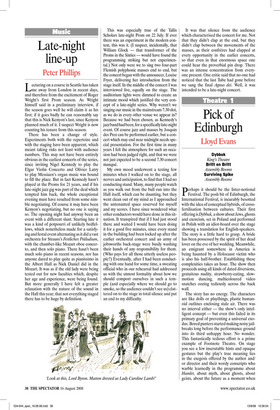Music
Late-night line-up
Peter Phillips
Lecturing on a course in Seattle has taken me away from London in recent days, and therefore from the excitement of Roger Wright’s first Prom season. As Wright himself said in a preliminary interview, if the season goes well he will claim it as his first; if it goes badly he can reasonably say that this is Nick Kenyon’s last, since Kenyon planned much of it. I suspect Wright is now counting his tenure from this season.
There has been a change of style. Experiments both with the repertoire and with the staging have been apparent, which meant taking risks not least with audience numbers. This may not have been entirely obvious in the earliest concerts of the series, since inviting Nigel Kennedy to play the Elgar Violin Concerto and Olivier Latry to play Messiaen’s organ music was bound to fill the place. But in fact Kennedy hasn’t played at the Proms for 21 years, and if his late-night jazz gig was part of the deal which tempted him back, the whole exceptional evening must have resulted from some nimble negotiating. Of course it may have been Kenyon’s negotiating, but no one is saying so. The opening night had anyway been an event with a different slant. Starting late it was a kind of potpourri of unlikely bedfellows, which nonetheless made for a satisfying and festal event alternating as it did a vast orchestra for Strauss’s Festliches Präludium, with the chamber-like Mozart oboe concerto, and then solo piano. There hasn’t been much solo piano in recent seasons, nor has anyone dared to play quite as pianissimo in the Albert Hall as Nick Daniel did in the Mozart. It was as if the old lady were being tested out for new faculties which, despite her age and experience, were being found. But more generally I have felt a greater relaxation with the nature of the sound in the Hall this year; that not everything staged there has to be huge by definition. This was especially true of the Tallis Scholars late-night Prom on 22 July. If ever there was an experiment in the modern context, this was it. (I suspect, incidentally, that William Glock — that transformer of the Proms in the Sixties — would have found the programming striking but not experimental.) Not only were we to sing two four-part Flemish polyphonic masses end to end, but the concert began with the announcer, Louise Fryer, delivering her introduction from the stage itself. In the middle of the concert I was interviewed live, equally on the stage. The auditorium lights were dimmed to create an intimate mood which justified the very concept of a late-night series. Why weren’t we singing our music in the mainstream 7.30 slot, as we do in every other venue we appear in? Because we had been chosen, as Kennedy’s jazz band had been, for a specifically late-night event. Of course jazz and masses by Josquin des Prez can be performed earlier, but a concert which may end near midnight needs special presentation. For the first time in many years I felt the atmosphere for such an occasion had been judged right, and that we were not just expected to be a second 7.30 concert manqué.
My own mood underwent a testing few minutes when I walked on to the stage, all nerves and anticipation, to find that I had no conducting stand. Many, many people watch as you walk out from the bull run into the Hall itself, which can be daunting, but they went clean out of my mind as I approached the untenanted space reserved for myself and my scores. I have since wondered what other conductors would have done in this situation. It transpired that if I had just stood there and waited I would have been doing it for a good five minutes, since every stand in the building had been locked up after the earlier orchestral concert and an army of jobsworths back-stage were busily washing their hands of any responsibility for them. (Who pays for all those utterly useless people?) Eventually, after I had been conducting with one hand for some time, a sweating official who in our rehearsal had addressed us with the utmost formality about how we should comport ourselves in such a temple (and especially where we should go to smoke, so the audience couldn’t see us) clattered on to the stage in total silence and put an end to my difficulty. It was that silence from the audience which characterised the concert for me. Not that they didn’t clap at the end, but they didn’t clap between the movements of the masses, as their confrères had clapped at every opportunity in the earlier concerts, so that even in that enormous space one could hear the proverbial pin drop. There was an intense concentration from everyone present. One critic said that no one had noticed that the last Tube had gone before we sang the final Agnus dei. Well, it was intended to be a late-night concert.


























































 Previous page
Previous page